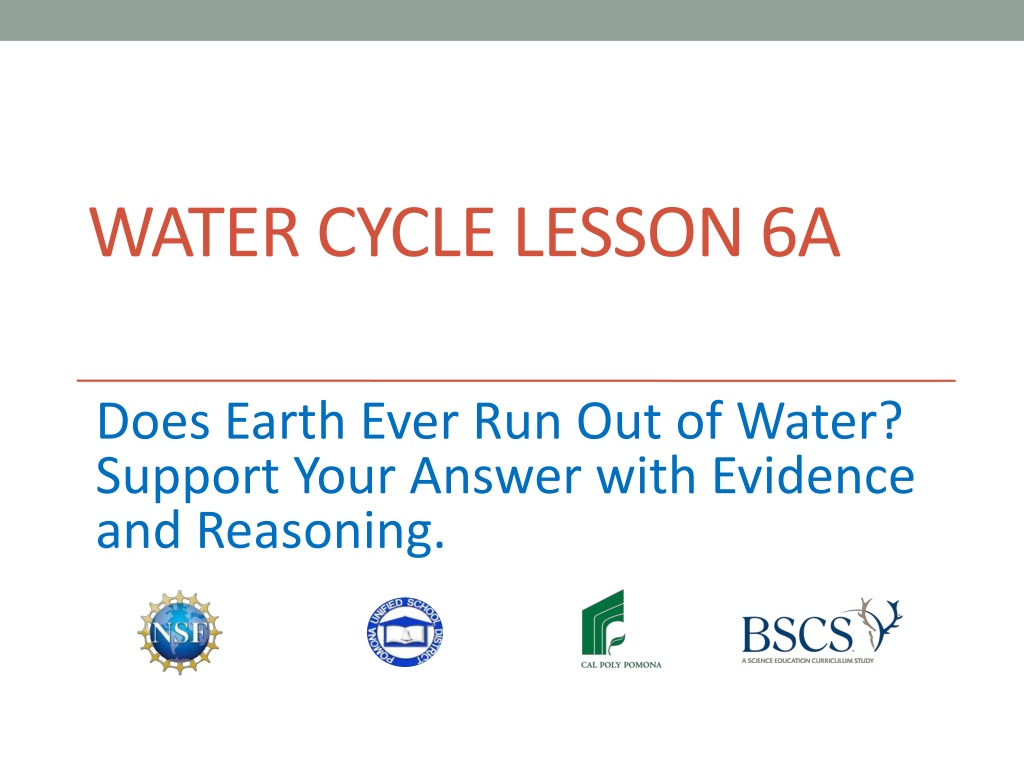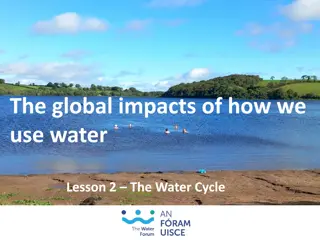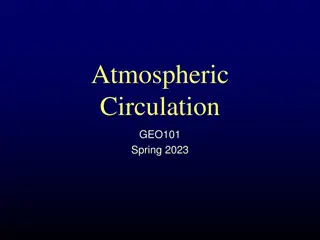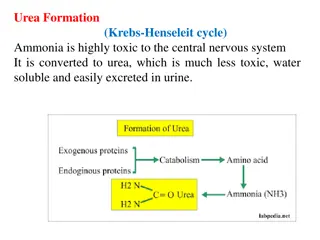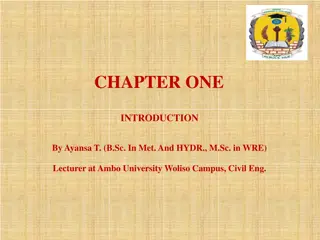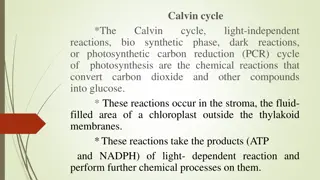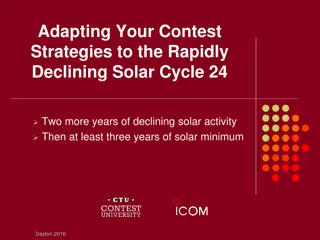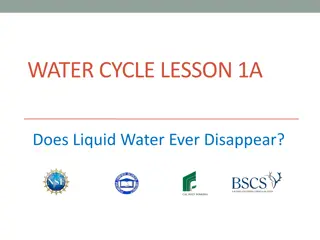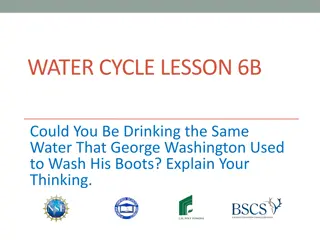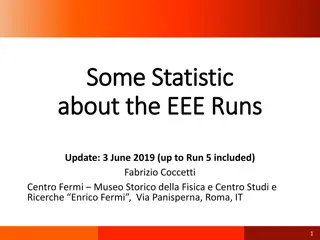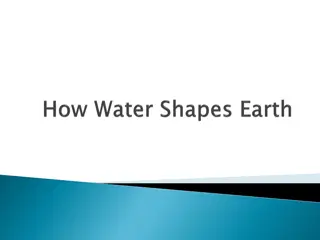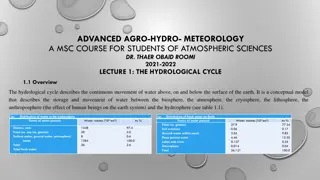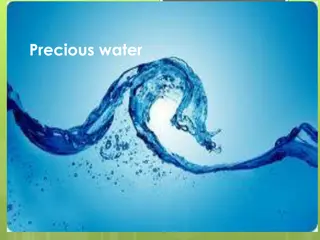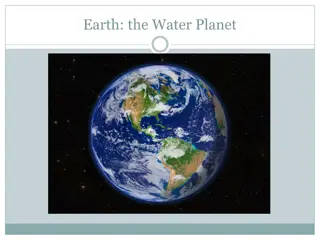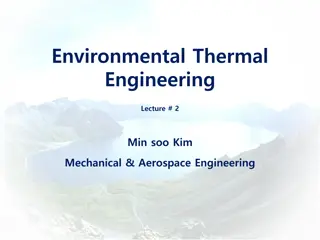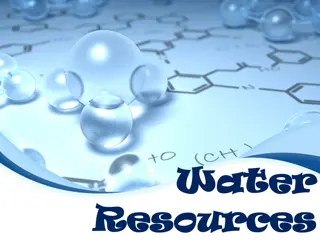Does Earth Ever Run Out of Water? Exploring the Water Cycle
Explore the question of whether Earth can run out of water by examining the water cycle, various experiments, and evidence to support reasoning around the conservation of water on our planet. Through discussions on open and closed systems, changes in water states, and gathering more evidence, this educational journey delves into understanding the sustainability of Earth's water resources.
Download Presentation

Please find below an Image/Link to download the presentation.
The content on the website is provided AS IS for your information and personal use only. It may not be sold, licensed, or shared on other websites without obtaining consent from the author. Download presentation by click this link. If you encounter any issues during the download, it is possible that the publisher has removed the file from their server.
E N D
Presentation Transcript
WATER CYCLE LESSON 6A Does Earth Ever Run Out of Water? Support Your Answer with Evidence and Reasoning.
Our Unit Central Questions How does water change in the world around us? Does Earth ever run out of water?
Question 1: How Does Water Change in the World around Us?
Todays Focus Question The second unit central question is today s focus question: Does Earth ever run out of water? Support your answer with evidence and reasoning. What do you think? What are your ideas and reasons?
Lets Revisit the Water-Changes System! What changes did you observe in this system? What happened to the water in the flask and the tubing? What processes did you observe in this experiment?
What Happened to the Water Level? Why didn t we have the same amount of water in the flask at the end of the experiment as we did at the beginning?
This Is an Open System! Some of the water in the system escaped into the air.
What If We Set Up a Closed System? If we poured the water from the test tube back into the flask in a closed system, would the water level in the flask be the same as when we started?
We Need More Evidence! We have some different ideas about what happens to water in a closed system, but we need to gather more evidence to answer our focus question.
The Three-Bottles Experiment What do you think happens to the mass of water when it changes states in a closed system? Water Water Water 1 Freezer 2 Room Temp 3 Heated Each of these bottles is a closed system.
Gathering Data on Mass Bottle 1 Freezer Bottle 2 Room Temp Bottle 3 Heated Mass at Start Mass at End 1. Copy the data chart into your science notebooks. 2. Record the starting mass of each bottle. 3. Use mathematical symbols to write an equation that shows the starting masses of the three bottles in relationship to each other.
How Will the Mass of Each Bottle Change? Bottle 1 Freezer Bottle 2 Room Temp Bottle 3 Heated Mass at Start Mass at End Write your predictions as mathematical equations: Use words and mathematical symbols < , >, and =. Example: Bottle 1 start = Bottle 1 end. You can create more than one equation. Be ready to give the reasons for your predictions.
Analyzing Sample Data: Did the Mass Change? Bottle 1 Freezer Bottle 2 Room Temp Bottle 3 Heated Mass at Start Mass at End 15.2 g 15.3 g 15.3 g 15.2 g 15.3 g 15.3 g What pattern do you see in these results? Describe the pattern in a mathematical equation. Use words, numbers, and symbols (<, =, >).
Gathering Data on Mass Bottle 1 Freezer Bottle 2 Room Temp Bottle 3 Heated Mass at Start Mass at End 1. Record the ending mass of each bottle in your science notebooks. 2. What pattern do you observe in your data? 3. Compare the results with the sample data. Is the pattern from both sets of data the same or different?
Patterns in the Data Look at each mathematical equation you came up with to represent the pattern you observed in the experiment results: Do you understand what this equation is saying? Does this equation accurately describe the data? Do you have any questions for this group?
What Do The Patterns Tell Us? Turn and talk with a partner about this question: As water changes states, does its mass change?Support your answer with evidence and reasoning. Use the sample data to answer this question with a claim, evidence, and reasoning. You don t need to write down your answer, but be prepared to share out.
The Results Did the mass of the water change when it was frozen or heated? NO! Did the amount of water in each bottle change? NO! Did the number of water molecules in each bottle change? NO!
What Water Molecules Can and Cant Do Let s look at what water molecules can and can t do when they change states in a closed system. They CAN They CANNOT Gain or lose mass Be destroyed Disappear into nothingness Gain or lose energy Speed up or slow down Change how they re arranged in relationship to other water molecules
Todays Focus Question Does Earth ever run out of water? Support your answer with evidence and reasoning
Earth Is Like Our Bottles! They re both closed systems for water!
Answer the Focus Question Today s focus question: Does Earth ever run out of water? Support your answer with evidence and reasoning. Claim: Your answer to the question (in a sentence) Evidence: What you observed mathematically in the experiment that supports your claim Reasoning: Using science ideas about molecules to support your claim and link it to the evidence Word Bank: Closed/open system Condensation Gain/lose energy Solid Water vapor (gas) Evaporation Molecules Mass Liquid
Lets Summarize! Today s big idea: In a closed system, water constantly changes state from a liquid to a solid or a gas, but the amount of water (its mass and number of molecules) doesn t change. Earth is a closed system for water, so water molecules keep changing state, but they never disappear or escape the system. So Earth never runs out of water!
Next Time Next time we ll use everything we ve learned about the water cycle to answer our central unit questions: How does water change in the world around us? Does Earth ever run out of water?
